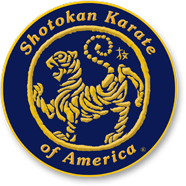Kyu Test (Grading)
Grading, or kyu tests, come twice a year, falling on the anniversaries of the birth and death of Ginchin Funakoshi. The test material itself is very simple. Karateka are asked to demonstrate all of the basic techniques (kihon), one or two kata, and ippon and sabon kumite (1 and 3 step sparring). There is no progression of more difficult techniques: the beginning and the advanced students are both expected to know all of the blocks, kicks, and punches. Advanced students will generally be called upon to demonstrate the more ‘advanced’ kata, but there is no firm rule for any given level. Instead, the karateka are evaluated based on the quality of their techniques and the seriousness with which they train.
Kyu testing is usually done in batches of three to five students, with the techniques being called and counted by a senior brown belt. A panel of black belts sits to one side and makes notes on the kihon, kata, and kumite of each karateka. After the last of the karateka have finished the panel of black belts compare notes and discuss each student. Grades are then assigned. Finally, the students are lined up and the senior black belt calls out the rank (kyu) that each student has been assigned.
SKA uses a grading system based on eight ‘kyus’ and five ‘dans’. Eighth kyu to 4th kyu are all white belt, 3rd kyu to 1st kyu are brown belt, and 1st dan to 5th dan are black belt levels. In SKA we don’t have colors or stripes for our belts.
Special Training
Perhaps the most important aspect of Shotokan Karate is Special Training. Twice a year, typically in January and June, karateka head off to a training camp where we push ourselves to our limits. The goal is to push past one’s mental barriers: to push harder than you thought possible. In the words of Ron Thom, President of SKA, “The essence of Special Training is reaching a true understanding of yourself and making a sincere effort to improve yourself.”
For the last several years, Special Training for the Pacific Northwest SKA and Canada West CSK dojos has been at Camp Elphinstone on the Sunshine Coast, just northwest of Vancouver, Canada. This camp is a YMCA camp in a beautiful spot in the woods overlooking the water. There are cabins with beds, showers, and a mess hall. The mess hall and another building serve as the training halls, and during the summer we often practice on the soccer field. The remote nature of the camp is perfect: there is nothing to do but eat, sleep, and train. The food is excellentand the camaraderie is even better.
The practices themselves are organized by senior black belts. The most important aspect of these practices is that the intensity is incredibly high. You punch faster, scream louder, and push harder than you would at a normal practice, without letting up. When you are so tired that you feel like you might drop you just keep going. This is the goal of Special Training.
Goodwill Cup (Tournament)
The Goodwill Cup is one of the oldest karate tournaments in North America, second in SKA only to the Nisei Week tournament held every year in California. The Goodwill Cup is a friendly tournament with several divisions for competition. There is a University of Washington vs. University of British Columbia team event, a five-person-team event open to all members, individual events for black, brown and white belts, as well as a women’s division and a kid’s division. The tournament is held in Seattle, WA and Vancouver, BC in alternating years, with the UW and UBC clubs hosting.
SKA Tournament Rules and Regulations
Other Activities
We traditionally go out for pizza and drinks twice a quarter with our Sports and Fitness Class. We also will occasionally do other club events, such as hiking, skiing, or catching a good old cheesy/artsy martial arts movie!
